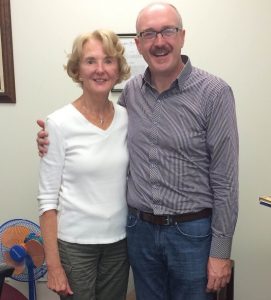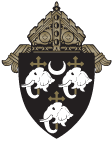Written by Joanna Gardner
Frank Patrinicola remembers exactly where he was the day he got the phone call.
The 52-year-old operations consultant for Dupont was in the company parking lot after work preparing for the drive to his South Jersey home when he decided to check his voicemail.
“As soon as she said, ‘I’m from Catholic Charities,’ I knew something was up,” he said. “And the reason for that is that I always have known that I was adopted.”
When he returned the call, he heard that his birth mother, Judi Bullock, had initiated a search for him and wanted, if possible, to meet.
Patrinicola was, at first, a little apprehensive. He had never felt the need to search for his birth family. Growing up and into adulthood he adored his adoptive parents, who were both deceased by the time he got the call. He had his own family, a wife and two children, and didn’t take the prospect of introducing a new figure into their family lightly.
His apprehension was small compared to Bullock’s. Now 67, Bullock was 16 when she gave birth to Frank. At the home for girls in Atlantic City where she stayed during her pregnancy, the mothers had two weeks with their children before signing the papers that would hand them over for adoption. But unlike most of the other girls, Bullock never heard for sure during those weeks whether her baby was going to be adopted.
“I never knew if my son was ever adopted. That was one of the things that was very sad for me. I had this feeling like maybe he was put up in foster homes or passed around,” she said.
It was 1964 and the pregnancy was never discussed again in Bullock’s home or at her school or with anyone, except one of the other girls from the home who she kept in touch with over the years.
“Back in those days you just forgot about it,” Bullock said. “It was taboo.”

But she never forgot about her son, carrying in her purse a picture of him as an infant that she had taken secretly with a friend at the girls’ home. She later married happily and had two daughters. But as she got older she kept wondering. She was worried about disrupting her son’s life, but she also needed to know if he had actually been adopted, and she thought he might appreciate knowing his medical history.
With the encouragement of her family, she decided to begin a search.
“It took a lot of courage for me to write that email,” she said.
Getting in touch with Catholic Charities, the agency that had placed Patrinicola for adoption, was just the first step. Bullock sent her email in March and the reunion wouldn’t take place until June. In between were many phone calls and meetings, for both parties, with Catholic Charities Director of Adoption Services, Sylvia Loumeau, who runs the agency’s Adoptions Research and Reunion program.
The program facilitates between five and 10 such reunions per year. Last year the agency handled nine research and reunion cases, about half of them from birth mothers seeking information about their adopted children.
Loumeau’s first step after receiving a call from either a birth parent or an adopted child is to send paperwork to the individual that asks for as much information as he or she is able to provide.
With that information she goes to Catholic Charities’ voluminous adoption files. The agency has facilitated nearly 2,500 adoptions, dating back almost to the Diocese of Camden’s founding in 1936. From whatever information is available in the file, she compiles a “social history report” of non-identifying information.
From these reports, an adoptee could learn the reason for the adoption, their birth parents’ ethnicities, or their medical history, if it’s available. A birth parent could learn about the adoptive parents: their ethnicity, occupation and physical description. But neither party would get access to identifying information, like names or contact information.
Loumeau shares the report during an initial counseling session. If that information is enough for the searching party, the process ends there. But many wish to go further and try to arrange a reunion. If that is the case, a series of counseling sessions and interviews begins.
“I try to prepare them for the things they might not have anticipated,” Loumeau said. “Many have an idealized version of who that other person is. While they might anticipate certain negative scenarios, they just can’t anticipate all of the eventualities that exist, the full range of life experiences that make people who they are.”
If all goes well during that initial interview, Loumeau begins a search for the opposite party. In the case of Patrinicola, it didn’t take long. He still lived in the same town where he grew up, less than a 10-minute drive from the Catholic Charities building in Camden where he was adopted.
After the initial phone call, he came in for his own counseling meeting with Loumeau where he learned about the birth mother who was looking for him.
“Sylvia was doing a lot to protect me. Judy told me later that she knew Sylvia was doing some screening,” Patrinicola said. “There was a lot of me trying to get comfortable with what [Bullock’s] intentions were. When I felt that we had very similar goals and were approaching this in a very pragmatic way, then I agreed [to meet].”
On that day in June, Bullock and her husband drove up from Maryland and Patrinicola and his wife drove down the street. Patrinicola walked down the same hallway where, 52 years earlier, his adoptive parents had come to pick him up, and met his birth mother.
“When I saw him walk through the door, all the 51 birthdays that I missed just came flashing back,” Bullock said. “The joy that I felt when I saw him was just amazing.”
Since the initial meeting, Patrinicola has made several visits to Maryland to see his mother. He’s met two sisters he never thought he had. The two families have become intertwined; Patrinicola’s daughter enjoys texting her new aunt.
“It really is wonderful,” Patrinicola said. “It’s like a new adventure, a new chapter. I was an only child my whole life. Now I’m a big brother.”
Adoption law is changing
Adoption law in New Jersey has changed to allow adoptees to access their original birth certificates on their own starting Jan. 1, 2017. Applications are now being accepted by the NJ Department of Health. Forms and more information are available online at www.state.nj.us/health/vital/adoption.
The New Jersey Catholic Conference has also instituted a helpline that anyone can call to get more information about the changes to the law: 609-989-4809. More information is available on the group’s website: www.njcathconf.com.
[imic_button colour=”btn-primary” type=”enabled” link=”http://catholicstarherald.org/reunited/” target=”_self” extraclass=”” size=”btn-sm”]Read in Catholic Star Herald[/imic_button]
